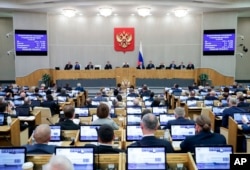Russian President Vladimir Putin signed a law Wednesday that will allow authorities to confiscate money, valuables and other assets from people convicted of spreading “deliberately false information” about the country’s military.
The bill sailed through the lower and upper houses of the Russian parliament, and was unanimously endorsed by the upper house last week.
The speaker of the lower house, Vyacheslav Volodin, said the measure includes harsher punishment for “traitors who sling mud at our country and our troops” and would “strip those scoundrels of honorary titles, confiscate their assets, money and other valuables.”
Russian officials have used the existing law against “discrediting” the military that covers offenses such as “justifying terrorism” and spreading “fake news” about the armed forces to silence Putin’s critics. Multiple activists, bloggers and ordinary Russians have received long prison terms.
The new confiscation law would also apply to those convicted of publicly inciting “extremist activities” and calling for actions harmful to state security or “discrediting” the armed forces. Discrediting the Russian military became a criminal offense under a law adopted as part of a sweeping government crackdown on dissent after Moscow sent troops into Ukraine in February 2022.
Russian state news agency Tass said that if someone is convicted under the new law, only money, assets and property “gained through criminal means” or used for activities against Russia’s national security could be confiscated. Draconian Soviet-era legislation authorized the seizure of housing for a variety of criminal offenses.

